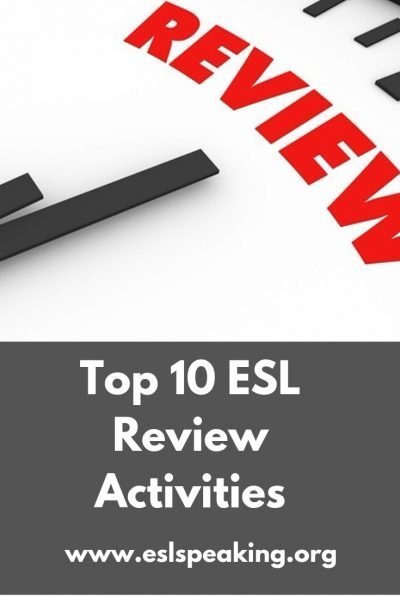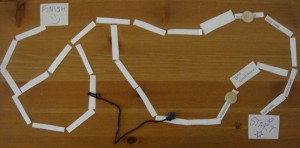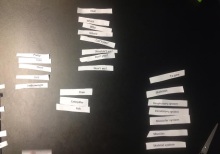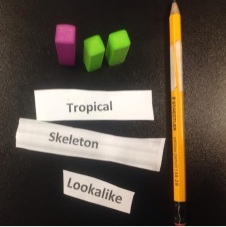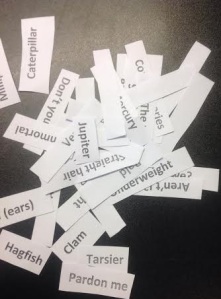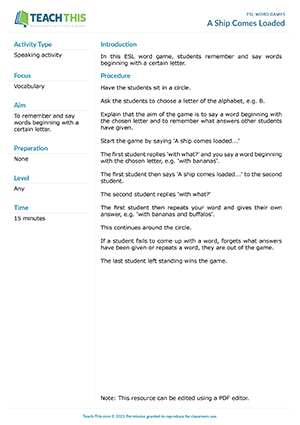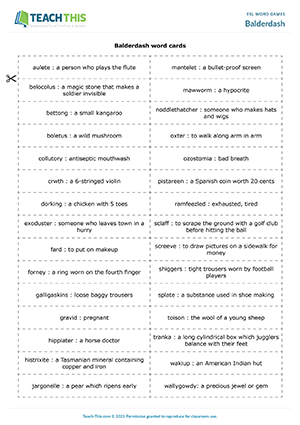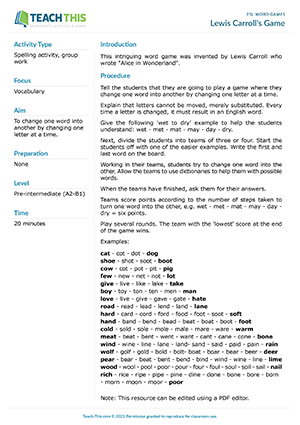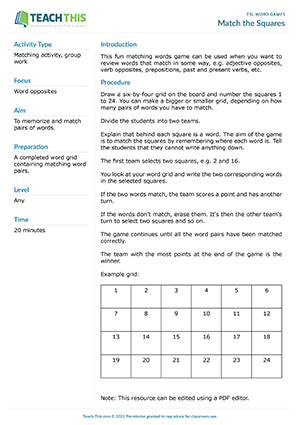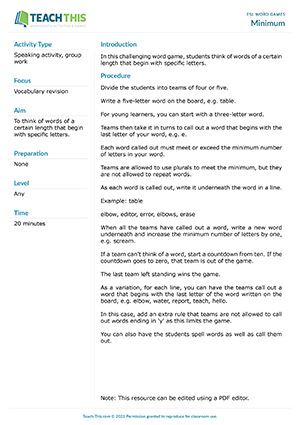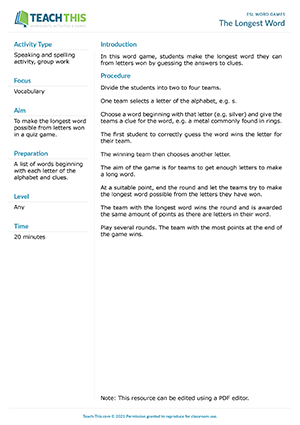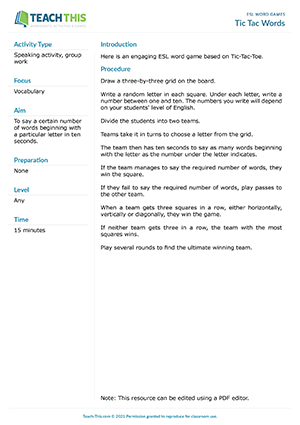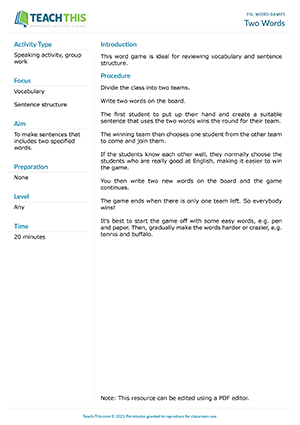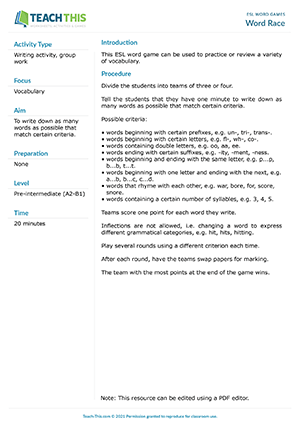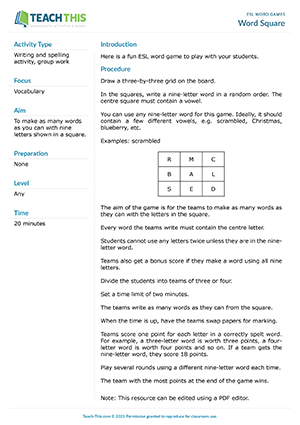The acquisition of new vocabulary is essential in terms of overall language advancement. However, there is always a need to review active words from time to time in order to use them fluently in speech. Here, we will present a couple of great vocabulary revision games which will perk up every classroom. Through these games the learners will feel how fun, entertaining and effective the learning process can be.
1. Charades
Charades is a fun and cool revision game. Students need to practice their acting skills to explain the words. This game is extremely easy to organize with minimal advance preparation. The only thing to be ready for is to keep a collection of vocabulary cards for the words you have studied.
The class is divided into two teams. Each team member takes turns acting out one of the words from the vocabulary set and explains it by acting out the word. If his or her own team can’t guess the word, the opposite team gets the chance to guess it. Each right answer equals one point.
Skyeng ищет преподавателей английского. Подробности по ссылке: Skyeng
2. Pictionary
Pictionary is also an entertaining game to play for vocabulary review. The rules are similar to those of charades except that instead of acting out the word, it is drawn on the board.
3. Bingo
Bingo can serve as a good revision game. From my experience, most of the groups/students like playing bingo because it gives them the chance to reflect on the words they have digested.
Students are given a blank bingo board and are asked to put the review words into the squares randomly. The teacher puts the active words in a hat or a box, takes them out one by one and defines them. If the student has a word corresponding to the definition, he crosses it out on his bingo board. When someone gets five squares in a row, they should shout, “Bingo!”
Check these articles out as well:
4. A memory style
A memory style card game can be another effective way for reviewing vocabulary. It requires some preparation before the game starts. For each word to be reviewed, one card should have the target vocabulary word and another card should have the definition of the word. You also need to have a big playing grid where you put the words and their definitions face down.
Each person turns over two cards each turn trying to find a match. If the cards do not match, he turns them over again and the next person tries to find a match. If he succeeds, he keeps the cards and gets an additional turn. The player with the highest number of cards at the end of the game wins.
The game can be modified even further. If you have accumulated enough synonyms or antonyms to the target vocabulary, you can practice matching target words to their antonyms or synonyms.
5. Categories
Categories is another awesome revision game which will make students energized and empowered. What they need for the game is to draw 4-6 columns on their paper and write a category at the top of each column. Categories fit the topics covered during the course. For example, if you have covered the business topics of Marketing, Work and Leisure, Ethics, Human Resources, Travel, you write these topics as categories.
You time the students and ask them to write as many words as possible under each category. As a further modification, choose a random letter and write it on the board. Give students enough time to write down a word for each category that starts with that letter.
Экономьте время на подготовку к урокам и проверку домашних заданий со Skyeng. Удаленный формат занятий, защита от внезапных отмен и график, который настроен специально под вас. Присоединяйтесь к нашей команде. Подробности по ссылке: Skyeng
6. Letter scramble
Letter scramble will make students really competitive and super fast. What you need is to take a list of words that your students have recently learned and write a scrambled version of each on the board. Students need to unscramble the words on their paper. The first one to finish deciphering all the words wins.
7. Stop the bus
Stop the bus is a cool game my students adore. I usually divide the class into 2-3 teams. One student from each team. This student sits on a chair facing his peers. Then from behind the student in the hot seat, show the other students a word from the lesson. The other students must try to describe what the word is without saying the actual word. And the student in the hot seat must guess.
The student who guesses the word shouts out “stop the bus” and checks the word with the teacher. If correct, the team gets a point. If wrong, other teams have the chance to guess the word by writing their versions on a piece of paper and passing the papers to the teacher.
8. Puzzles
Puzzles is another cool and easy tool to review the material in an effective way. What I like about this way of vocabulary revision is that students can work in pairs or groups while trying to find words matching the definition in the crosswords. They learn by listening to each other, cooperating to find the right answer. In this way, they both review the material and improve their teamwork skills.
Follow this link to get templates of different types of puzzles.
We also recommend watching a video with Alexei Konobeev. The speaker shared games to help your students remember new vocabulary. These games do not require special training and you can adapt them to any age and level.
We hope that all these games would serve their best to liven your vocabulary revision sessions and make them more meaningful and effective.
Which of these games have you tried? Which ones have you picked up for your next revision slot?
If you’re looking for some ESL or EFL review activities and games, you’ve come to the right place. Keep on reading for my favourite ESL review games to check out! And, don’t forget to provide your students with lots of opportunities for review in class.

Fun review games and activities
Keep on reading for more details about each of these ESL review games and activities. These English review activities are fun, engaging and student-centred.
If you’re looking to make sure your students understood what you taught them in a previous lesson, consider using one of these ESL review activities and games. They’re fun, engaging and interesting, which will equal happy students and happy teachers!
Most of them are appropriate for just about any age or level of students, just adjust them accordingly. Click on the titles of each ESL review game to be taken to the full description of the activity.
But, please remember that the best language learning often happens outside of school, so please remind your students of this as well.
#1: Odd One Out ESL Review Game
This ESL warm-up activity is also one of my favourite ESL review activities. It’s fast, easy and great for making sure that students not only understand new vocabulary words, but the meaning behind them as well. It lends itself particularly well to something like science or sports.
I often use this one to start off my classes with as a quick warm-up. But to make it a review activity, I just use vocabulary words from previous classes.
You can find out more here: Odd One Out.
#2: Dictogloss
Dictogloss is another one of my favourite ESL review activities. It’s heavy on the listening and then students can either respond with writing or speaking, depending on your preference. You can use it to reinforce any grammar or vocabulary that you’ve taught the students in previous classes.
Younger learners may find it too difficult, but it’s ideal as a review activity for high school students, university students or adults.
Learn how to do it here: Dictogloss.
#3: Flip-Chart
This is another one of my favourite ESL review games that works best for smaller classes of 12 or fewer students. In bigger classes, it’ll get too chaotic. You may be tempted to make 3-4 teams, but this gets kind of boring because there’s too much lag time between turns.
Basically, the students have to describe a word (written on the board or page above their heads) to a captain on their teams, who has to say it. It’s a nice way to review new vocabulary terms.
Check it out here: Vocabulary Review Activity.
Even More ESL Games and Activities
#4: Concentration Review Game
This is a fun English review game that kids love, although you can use it for beginner teenagers or adults too. It’s perfect for reviewing new vocabulary words and definitions. Even high school students get into it!
Perhaps the thing that I like best out this ESL review game is that it’s a test of the memory as well. So, students who are a little bit weaker at English, but may have a better memory actually have a chance at winning.
It’s fun, challenging and helps students to remember new words. Try it out with kids as well as adults and I’m confident that you’ll be happy with the results.
Find out more about this ESL review game: Concentration Memory Game.
#5 Grammar Review Game: Disappearing Text
Try out this ESL review activity at the end of class to review grammar concepts or vocabulary. It helps these things become a bit more automatic with building complete sentences.
It’s also an excellent test to make sure students have really learned what you were trying to teach them in that class. Correct word order in a sentence? Yes, that’s what this activity is ALL about, so it’s particularly good for absolute beginners.
Check it out here: Disappearing Text Review Activity.
#6 Final Exam Review Game: Running Dictation
This 4-skills, student-centred ESL activity is one of my favourites. You can use it to review just about anything and it’s perfect to use before a midterm of final exam to review key vocabulary and grammar concepts.
Try it out in some of your classes today and I’m sure your students will love it. It’s perfect for those “dead” classes who are apathetic to just about everything! It has a serious element of competition to it that students seem to love.
The hush that comes over the class is one serious sign of how engaging this game is! It’s certainly one of the best class review activities that I know of.
Learn More about one of the best review activities for adults (although you can use it with kids too) here: How to Play Running Dictation.
#7 English Review Games: Board Games
I love to play board games in my real life and so I’m always sure to use them frequently in my classes. They’re one of the best ESL review games I can think of, especially for middle school or high school students!
It’s really, really easy to make your own ESL board games and it’ll only take a few minutes once you get the hang of it. Of course, you can sometimes find board games in the teacher’s resource books, but you can write you own easily if you can’t.
Students really love them and they work in a class of any size. You just have to divide the students up into groups of 3-5. Don’t forget to bring a little prize for the winner in each group–it makes these ESL board games a bit more fun!
Find out more details about one of the best fun test review games: Board Games for Language Learners.
Learn More about ESL Board Games:
#8 Review Activities for Adults: Surveys for ESL Students
Surveys are one of my favourite “end of unit” ESL review activities. They get the students up and out of their seats and talking to their classmates. They also encourage active listening and follow-up questions, which students are often quite weak at.
Click on the link above to see six of them that I use in my own classes in South Korean universities. I generally find that I use them in each course a few time a year. ESL surveys really are that good!
Helpful tips for English surveys:
- Be sure to emphasize that this is a 1-1 speaking activity, or you’ll have groups of students doing it together.
- Encourage students to complete this activity using 100% English! It really is possible and also very beneficial.
- It can be useful to give some feedback at the end of this activity on how the class did.
Learn more here: ESL Board Games.
ESL Review Games
#9: Rock-Scissor-Paper
If you have very low-level students who are struggling to put together basic questions and answers, this is the ESL review activity for you! The best part about it is that it gets the students up out of their seats and moving around the classroom.
The way it works is that there are little strips of paper with a question and then the corresponding answer (separate pieces). Students will get a few random pieces and then have to circulate around the class looking for their matches. It’s one of the best review games before a midterm or final exam.
Learn how to play this game here: Rocks-Scissor-Paper.
#10 Review Activity: Simple Role-Plays
If you ask students want they want to work on in your classes, they’ll often say English conversation. Even beginners will say this! However, something like free talking can be impossible for lower-level students. Role-plays are a nice bridge for them.
Role-plays are often quite a nice way to round out a unit. They are one of my favourite ESL review activities, especially for lower-level students. They encourage students to get a bit creative with the language that they’ve learned. Personalizing it can often make it far more memorable.
If you ask students what they want to work on in class, they’ll often say English conversation. However, this can be difficult with lower-level students. Role-plays help bridge the gap and are a nice way for students to learn the basics of conversation.
Learn more: Role Plays for English Learners.
Find out more about how I use ESL role-plays in my classes:
#11: Task Based Activities
Task based activities are when students have to work together to accomplish something. In the case of review, it could be designing an activity or game that helps their classmates review a certain grammar or vocabulary point. Or, they could design a worksheet to do this as well.
Do you want to know more about this style of teaching? Check out the following: Task Based Language Teaching.
#12: Hot Potato Review Activity
This is one of the most versatile TEFL activities out there and can be used for any grammar or vocabulary point. It makes an excellent review activity. The way it works is that students pass around a “potato” and when the timer goes off, the person holding it has to do something.
In this case, it might be to answer a review question. Or, they could have to make a question to ask another student. Find out more about this fun review activity here: Hot Potato TEFL Game.
Reviews games for ESL/EFL
#13: ESL Charades Class Review
Charades is a fun way to review vocabulary. You’ve probably played this at a party before. The way it works is that students have to act out a phrase to their teammates who guess what it is. Do you want to try it out in your English class? Learn more about one of the best English review games here:
TEFL Charades.
#14: Flashcard Sentences
Flashcards are definitely one of those things that I think are under utilized by most English teachers. They are super versatile and can be used for a wide range of activities, including review. The sky is the limit so be sure to check this out for some specific examples of how you can use them in your class:
TEFL Flashcard Activities.
#15: Chain Spelling Review Game
A quick but fun way to review new vocabulary words is to play the chain spelling game. It’s basically a “last person standing” kind of activity where students have to spell out words, one letter by one letter in a circle. When someone misses a letter, they are “out.”
Do you want to find out more about how to play? You can see all the details right here: Chain Spelling Game.
#16: Jigsaw Activities
#17: What are you Cooking?
One excellent way to review the “food” unit that’s super common in many ESL textbooks is to do this fun activity. The way it works is that students have to design a 3-course menu based on ingredients given to them by another group.
Want to try out this ESL food review activity? You can see all the details here: What are you Cooking ESL Food Activity.
#18: Dialogue Substitution
A nice way to review key grammar points or vocabulary words is to use this dialogue substitution activity. Often ESL textbooks will have conversations in them but if you ask students to read them with a partner, they’ll often do this mindlessly. This isn’t their fault—it’s just that they don’t really have a reason to read!
Instead, consider using this activity which takes out key words and then students have a word bank from which to fill them in. The words you take out depends on what you’ve been teaching your students. Want to know more? You can get all the details right here:
ESL Dialogue Substitution Activity.
#19: ESL Picture Activity for Reviewing Vocabulary
A nice review activity can be to show students an interesting picture related to the topic of the day. Then, students have to make some sentences related to what they see, either by speaking or writing. It’s simple, easy and effective for getting students to use the key new vocabulary.
#20: Flashcard TEFL Review Game
There’s nothing like using flashcards to review key vocabulary that students have learned in your classes. Here are some fun review activities to try out with your English learners:
#21: Typhoon Review Game
Try out this TEFL game if you want to have some serious fun before a midterm or final exam! It’s ideal for reviewing large amounts of materials in an engaging and interactive way. Every time I use it in class, students talk about it for weeks afterwards and want to play it again! Find out more here:
Typhoon ESL Game.
#22: Preposition of Place Review Quiz
Check out this simple game to review prepositions with your students:
#23: Basketball ESL Game
This is an easy review game that’s ideal for covering simple grammar points. It’s best for children but I’ve also used it with teenagers with great success. It’s so fun that students always ask to play it again! Check it out here:
Basketball Challenge ESL Game.
#24: Speaking Fluency Activity
Fun Review Games and Activities: FAQs
There are a number of common questions that people have about using ESL review games and activities in class. Here are the answer to some of the most common ones.
What is a Review Lesson?
A review lesson is a lesson that covers material from previous classes. It’s generally done before an exam or test, however it doesn’t have to be related to this and can be done for its’ own sake. Reviewing topics frequently helps students consolidate new grammar and vocabulary.
Is ESL Review Important?
Review is vital to ESL learners, or any language learner for that matter. It’s the best way for students to get enough practice with new grammar points and vocabulary so that they become familiar with it and are able to use it effectively.
How do you Review Vocabulary?
Here are some of the best ways for ESL/EFL students to review vocabulary:
- Odd One Out
- Dictogloss
- Flip-chart review
- Concentration
- Disappearing text
- Running dictation
- Board games
- Surveys
- Rocks-scissor-paper
- Role-plays
- Task based activities
- ESL Hot Potato
- Flashcard sentences
- Charades
Review activities for EFL/ESL
How can Students Take Responsibility for Review?
Although you as the teacher can help students with review and create opportunities for this in class, it’s ultimately up to them whether or not they learn the new vocabulary and grammar that you’re teaching them. The best learning often happens outside the classroom and not necessarily just cramming for a test.
Don’t forget to remind students of this fact on a regular basic. Give them tips and ideas for expanding their skills and education beyond just sitting in your class. Think of it as a team sport and you’re the coach.
One of the ideas that I find works particularly well is keeping a log or journal of new things learned and then reviewing it periodically. If your students aren’t great at doing this on their own, add some homework in there.
How Can I Help Students Remember New Words and English Grammar?
All the time, students ask me for tips on now they can remember new English vocabulary words, or grammatical points they learned in class. Here are a few of the tips that I give them:
- Review is very, very important. You can review a word after 24 hours, after one week, and then a month later. If you can still remember something a month later, it’s probably with you.
- Flashcards are ideal. Make sure you go from the English to native language, but also the much harder native language to English. Mix them up every time you study because it forces your brain to work harder. Also be sure to take out the ones that you know very well and work more on the more difficult ones.
- Use a vocabulary notebook.
- Read and listen a lot. The more times you hear new words “in the world,” the better the chance you have at remembering it.
- Learn with a friend and test each other.
- Learn new words every day, but not too many. 5-8 is an ideal number.
- It’s better to review for 10 minutes a day than 10 hours once a month.
Of course, review is by far the most important thing so keep doing it!
My Theory Behind Lots of Review
I incorporate a ton of review into my English classes. At the start of the class to review material from previous lessons. At the end of a class to review what we studied that day. Even in the middle of the class to review some difficult grammar or vocabulary that I’m not sure my students have a full grasp on. Then, I dedicate an entire class to it before the midterm and final exam.
Too much? I don’t really think so. My theory is that it’s far better for students to know a few things really, really well than to do lots of things not at all. It’s the things they know well that they’re actually going to use in real life when they start writing and speaking in English. And they’ll have a solid takeaway from your course.
If you want to learn more about the theory behind teaching ESL, consider some professional development opportunities including conferences. It can help bring some order to the sometimes confusing world of language teaching.
Want the Ultimate ESL Activity Book?
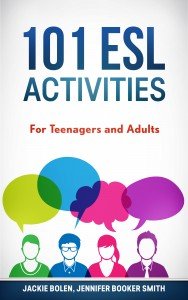
Find What You’re Looking for a Minute
Do you want to know the best part? All the games and activities are organized by category for easy use (speaking + listening, reading, writing, 4-skills, warm-ups + icebreakers). Yes, there are even lots of review activities and games too!
It’s lesson planning made easy!
Available in a Variety of Formats
You can easily get the book on Amazon today. There are two formats: digital + print. The digital one can be read on any device by downloading the free Kindle reading app.
Keep a copy on your bookshelf as a quick reference when lesson planning. Or, have a copy on your phone for planning lessons on the go in your favourite coffee shop for example.
Where Can I Get It?
Check out the book for yourself today by clicking the link below. And, get ready for some ESL awesome in your life, okay?
What are some tips for Review Classes or Activities?
If you want to do some review with your students, here are some tips and tricks for making it as helpful as possible.
#1: Have a Plan
Instead of just giving students free time to review before a test, have a plan. I like a mix of worksheets, textbook review pages, videos, task-based learning, games and activities. Of course, it depends on what the class is: writing, speaking, etc.
#2: Don’t Hit your Students with Everything at Once
If you dump every single grammar and vocabulary item you studied that entire year onto a single sheet of paper, it’s going to be overwhelming. Instead, take it in sections at a time, and you may consider not reviewing the very fine details. Most students are happier with the big picture stuff.
#3: Have a Few Minutes of Question Time
Students often have questions about the material they’ve learned, or about the upcoming test. Leave a few minutes at the end of class to field these.
#4: Have Students Review Things
If you have upper-level students, you may want to get them to teach a small mini-lesson (5-10 minutes is ideal) for a certain concept. It’s fun for the students, and often quite memorable.
#5: Avoid Introducing New Things
Review is all about the old, so avoid the temptation to introduce new concepts. This will often cause some major frustration for your students!
#6: Keep it Simple
Remember that some of the things you’re reviewing may have been covered in class months ago. Keep it simple!
I generally aim to give students enough information in a review session so that the average student could be a “B” on the test if they knew everything well. The “A” students will have to study more on their own.
What I’m saying is don’t give ALL the information that the top students will know because you’ll overwhelm the majority of your class.
#7: Make it Student-Centred
Your students should be working hard, not you. After all, it’s your students who have to learn the language, not you!
With this in mind, your activities and games should be focused on them as much as possible. Avoid the chalkboard warrior things as much as possible in your review sessions.
#8: Consider an Entire Review Class
The class before the midterm or final exam, I dedicate exclusively to review. I want my students to do well on my tests, and this is one way that I try to help out the weaker students a little bit.
I generally come up with 3 activities for a 1.5-2 hour class. Perhaps a board game, concentration and then perhaps a survey. Of course, all the content is from the course and will be on the final exam.
Students are used to studying everything individually. For example, the simple past, then past continuous the following week, and problem/advice the week after. They’re not used to seeing everything together, so I try to give them this experience during my review.
Finally, I’ll give lots of hints to students who are paying attention about what will be on the test. Plus, I allow for question time and I’m generally quite free with advice about the exam’s content.
More Ideas for How to Finish a TEFL Class
Have your Say about these ESL Reviews Games
Do you have one or two go-to review games in your English classes? Leave a comment below and let us know. We’d love to hear from you.
And don’t forget to share this on Facebook, Twitter, or Pinterest. It’ll help other busy teachers, like yourself find this useful resource filled with grammar review games.
Also feel free to contact us if you have any questions about teaching English.
Last update on 2022-10-15 / Affiliate links / Images from Amazon Product Advertising API
Board Game for Reviewing Vocabulary
Basic Idea: Create a simple board game with vocabulary cards. Each card is a square, or piece, of the board. When a player lands on a card, he/she turns it over, revealing the vocabulary item. The player must then make a (perfect) sentence with the vocabulary item. If the player fails, he/she must go back to his/her originating square. The player who reaches the end first wins.
Strengths: fun + facilitates vocabulary review
No. of Students: 2-4 per board
Levels: Pre-Intermediate, Intermediate, Upper-Intermediate, Advanced
I have used this vocabulary review activity with adult conversation groups. I believe they find review games a refreshing break from our weekly topic-based conversation classes. Although the idea of a playing a board game in an adult ESL class may not sound like an optimal use of class time, games can be effective review tools. In this game, students can show you what they have learned and concentrate on making well-formed sentences with recently studied vocabulary.
Vocabulary Review Board Game Preparation:
Select 20-40 vocabulary items that you’d like to review. This list can include words (e.g. «suggest») and grammar items (eg. «second conditional»). Next, think about how you want to make a simple board game with the items. There are two ways:
> The Digital Method: If you have time and prefer using a computer, you can download board game templates from several sites (for example: here’s a snakes & ladders template and a blank board game template). Or you could make a template in Word or Excel.
> The Analog Method: This is the method I prefer. I print out the vocabulary list and then cut them into cards (or you could just write them out). I create some additional cards such as «Lose a Turn», «Go Again», «Switch!», etc. I put the cards in an envelope and head to class.
Vocabulary Review Board Game Execution:
- Have your students help you lay the vocabulary cards face down on the table.
- Arrange the vocabulary cards into a board in whatever way you want. Obviously, there should be a start and finish. You can create warp zones (represented by the black string below), or whatever you’d like. Get creative.
- Instead of using a die, I recommend a coin (heads = move 1 space, tails = 2). That way, most of the vocabulary items will get reviewed instead of skipped over.
- Have your students start and work their way across the vocabulary board.
You can play the game any way you want. I have students make a perfect sentence with the word on the card. If they fail, I correct their sentence, get them to repeat it, and then make them go back to the originating square. The next time they land on the card, hopefully, they can fix their mistake.
Have fun with it and modify the rules as you’d like.
This is an example of a vocabulary review board game. Give it a shot and let us know how it goes.
black string = warp zone
— Matthew Barton / English Current
on July 26, 2015 •
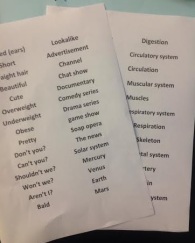
Here are some ideas for reviewing vocabulary in groups. For these tasks I didn’t use all 200 words, but about 60 or so. To prepare, give students the word list and get them to cut all the words up so each one is on a different slip of paper. Get them to mix all the words up and put them face up on the desk.
1) Do you remember…?
To start off, ask the students to separate the words into two lists – words they remember and words they don’t. The task sounds simple, but it gets a lot of discussion going if they are working in groups, as they will share definitions and remind each other of the meanings.
2) Which topic?
Next, ask students to organise the words by topic. Don’t restrict them by giving particular topics, let them decide how they want to categorise the words. Afterwards, get students to rotate to another table, have a look at another teams words and see if they have organised them in different ways.
3) Which word type?
Repeat the above, but get students to categorise the words by form (noun, verb, adjective, etc). Again, let them decide the categories. Don’t worry if you’ve just got a load of nouns to revise – you can encourage creativity – ‘words including a consonant cluster’, ‘words from the first half of the alphabet’, etc. Make this competitive by adding points for the most interesting categories and they’re bound to come up with something!
4) Which stress pattern?
Ask students to group words by their word stress patterns, giving them a few prompts on the board if necessary. They could mark the stress pattern of their categories using Cuisenaire rods.
When I did this the other day, I made the pronunciation stage a little more specific. I just put one different stress pattern on each desk (using the rods), and asked students to find any of their words which match that stress pattern.
Another categorisation task might be to organise the words by number of syllables. Plenty of options I guess.
So that’s the meaning, form and pronunciation of the words reviewed. Time to have some fun now!
5) Including words in a sentence
Students take a word at random and try to include this in a sentence. I find using a dice makes this simple activity more interesting. List numbers 1-6 on the board and give each number a form or structure you have taught (1 = question tags, 2 = passive voice, etc). Students select a word and roll the dice – their sentence must include both elements.
6) Lose your words
This is far more fun! Have all the words in pile in the middle of the desk. Students take 10 each. The object of the game is to get rid of all your words. You do this by including the word in a conversation. Anyone on the table can talk, there is no set order, but you can’t get rid of more than 2 words in a row. You must try to include the word in a relevant way, not just shout it out. Your group can overrule you if your sentence is completely disconnected.
An example of conversation from my last class
A: I watched a documentary last night on Tarsiers
B: er..so did I. It was very sad because one of the Tarsiers was overweight
C: Another one was like a skeleton, very thin!
Actually, I think I only play this game as the conversations make me laugh. The students really enjoy it as well though!
7) Guess the word
The old ones are the best. One student takes a pile of words. They have one minute to describe as many words as they can to the team, who guess what the words are. They take turns describing the words, and tally up who got the most points at the end of a few rounds.

That’s the same as the above really but on a whole class level.
9) Creating a performance
This is my favourite way to re-use some of the vocab, but it might not work for every group. Imagine you have groups of 4 
- Students work in pairs
- Set the scene. I display this random picture on the board, and tell the students that this man went missing last night. His wife was extremely worried as he was gone all evening, but he’s just walked through the door. She asks him ‘where have you been????’
- Students then select 8 words from the vocabulary pile at random
- They work together to write/tell the story of what happened to the man, and they must include all the words (allow 5 mins). Each pair will end up with something very random, e.g.
‘The man went out to search for caterpillars to feed to his pet Tarsier. While he was walking down the road, he was hit by a truck. He survived, and realised he was immortal…. etc
- Students then tell their story to the other pair. The group as a whole decide which story is the best
- OPTIONAL: Students select only one story to use, but must edit the story to include two of the words from the other story that they’ve discarded
- Groups work together to produce a silent performance of their story to show the rest of the class.
- Groups watch each performance, and guess the words which had to be included in the story.
- Alternatively, you can just make it a spoken performance, your choice.
10) Typhoon review game
I got this ages ago, again from the Waygook.org forum (uploaded by Sweetpapo). There are plenty of review game templates out there, but this one continues to serve me well. It’s easy to make the questions on each slide, you can prepare a game in about 10 minutes.
Typhoon review game template courtesy of Sweetpapo
11) Spelling board races
I never thought this would be the case, but lately my students have gone mad for spelling races. I put the students in two lines – the two people nearest the board have pens. I say one of the review words, and they must spell this on the board. However, each person can only write one letter, and then they pass the pens on to the next person in the line who adds the next letter, and so on. The first team to spell the word wins.
12) Phonemic script practice
Students choose 10 words at random and practice writing these in phonemic script. Make sure they don’t only choose one syllable words, include some longer words so they can practice marking stress. You can also do phonemic script board races if students are confident using it.
Categories: General, Lesson Ideas, lists, vocabulary
Tags: British Council, elt, elt games, lesson ideas, lesson list, lesson planning, stress patterns, tefl, vocabulary lists, vocabulary review

Guessing games are great to use as warmers, fillers, and review activities. Not only are they a lot of fun, but they are also fantastic for learning vocabulary and grammar.
On this page we list the 10 super fun guessing games for kids. Although these activities are mainly aimed at young learners, many of these guessing game ideas can be easily adapted to use with adults and teenagers.
For more classroom game ideas, check out our other post, 10 Incredibly Fun Vocabulary Activities For ESL Kids.
1: Guess the Word Games
Whichever topic you are teaching, a simple guess the word game, although simple, can be very effective. Show students some flashcards and ask them to repeat after you. Once students have practiced enough, choose one flashcard, and don’t show the students. Then ask them to try to guess what the word is while using the target expression.
For example, if you teaching animal words, when students guess they can ask the teacher ‘Is it an elephant?’, and the teacher can respond ‘Yes, it is. / No, it isn’t.’.
2: Hidden Picture Guessing Games
In this guessing game there is a picture hidden behind some color squares. As you click the squares the image is slowly revealed and students must try to guess what it is.
This guess the picture game is a great way to introduce or review new words with students and can be used with any vocabulary. For hidden picture PPT games on many topics, and an editable template, click here.
3: Guess the Picture (Pictionary)
This simple guessing game idea needs little to no prep. All you need for this game is something to draw on. To play as a whole class, ask a student to draw something on the board from the lesson and ask students to guess what the picture is of.
To make it more fun, divide the class into two / three teams. Give each team 30 seconds or so to guess as many pictures as they can. This game is a lot of fun and young learners especially love showing off their artistic skills.
4: Guess the Mystery Object
Using real objects in the classroom is a great way to connect the vocabulary and grammar that students are learning to the real world. A great way to do that is with this guess the object game. To play, you need a bag or a box to put the mystery objects in.
Invite students one by one to come up to the front of the class and reach into the bag/box and feel the object inside. Without looking at the object, they must try to guess what the mystery object is. This can lead to some hilarious guesses! This activity is great for both kids and older ESL students.
5: Online Guessing Games
In these online guessing games, students must use ‘Telepathy’ to read the teacher’s mind and find out the answer. Of course, your students can’t really read minds, but kids love pretending that they can.
In these guessing games each answer as two possible answers and students must choose ONE and write it down. If they get it correct, they get a point. If they get it wrong, they don’t. Many online guessing games can be found on our Activity Videos page.
This game can be played individually or in pairs / small teams. For a Telepathy game PPT template, and a printable answer worksheet, click here.
6: ‘I Spy’ Guessing Games
When you were a child you probably played a variation of this game at one time or another. In the classic (British) version of I Spy, one person would look around and choose an object that they can see and then say ‘I spy with my little eye something beginning with (b).’. At which point the other people must try to guess what object beginning with the letter b he/she is thinking of.
This kind of guessing game can be used in your English class to review many different words and topics. For example, if teaching colors, one student can look around and choose an object and then say ‘I see something (green)’. The other students must then guess what green thing they are thinking of.
Or, if you are teaching adjectives, one student can look around and choose something and then describe it using adjectives. For example, ‘I see something big and heavy.’.
7: ‘Act It Out’ Guessing Game (Charades)
In the classic version of charades people would use actions instead of words to act out the title of a movie, book, play, or song. In the English classroom, this kind of activity can be used to review key vocabulary and expressions that students have learned.
To play, write down the key words / phrases from the lesson on pieces of paper and put them all in a small container. Then divide the class into 2/3 teams. One person from each team will choose a piece of paper and act out the word without speaking or making any noise. If the team guesses correctly, then they get a point.
8: Guess The Word To ‘Save The Teacher’ (Hangman)
Hangman is a classic classroom game in which students must try to guess the word the teacher is thinking of by guessing letters of the alphabet. If students guess the wrong word then the teacher would begin drawing a picture of a hanging man. If students get it wrong too many times and the teacher completes the picture, then the students lose.
Although this drawing is just a simple stick figure, the idea of showing children a drawing of a man hanging from his neck seems quite gruesome to me, and not appropriate for kids. As a fun alternative to hangman, try ‘Save The Teacher’ using the video above. The rules are exactly the same as hangman.
To play, think of a word and draw a small horizontal line corresponding to each letter of that word. Then ask students to guess the word by first guessing letters from the alphabet. If they guess correctly, then write it in the correct space on the board. If students guess wrong play the video and the fuse will get closer to the rocket. When students guess wrong too many times, the teacher and the rocket will blast off into space!
9: ‘What Am I?’ Guessing Game
In this guessing game, the teacher would think of something and then give students 3 clues as to what it is by saying sentences as if he/she is the object. For example, if the word the teacher is thinking of is ‘The Sun’ then the 3 clues he/she might say “I am hot. I am bright. You can’t see me at night. What am I?” This is a great way to reinforce students’ understanding of the lesson’s vocabulary and a fun review activity. For more ‘What am I? quizzes check out these ’40 What Am I?’ questions.
10: Guessing Games With Cards
Most ESL textbooks these days come with small word/picture cards at the back. If you’re not so lucky, you can download and print free mini-flashcards from our flashcards page. To play this game, ask students to make groups of 3/4. Then give each group a set of cards. Then one student from each group should close their eyes while the other members of the group point to one of the cards.
Then the student should open his/her eyes and guess what card they chose while using the target language. If he/she guesses correctly then they can keep that card. Then it’s the next students turn. The game finishes when all the cards are gone and the students with the most cards is the winner.
Thanks for reading. I hope you found some useful guessing game ideas for your next class. Before you go, don’t forget to check out our free other free games and activities including PowerPoint Games, Online Quizzes, and Online ESL Games.
A Ship Comes Loaded
ESL Word Game — Vocabulary and Speaking: Memorisation, Forming Words from Prompts — Any Level — 15 minutes
In this ESL word game, students remember and say words beginning with a certain letter. Have the students sit in a circle. Ask the students to choose a letter of the alphabet, e.g. B. Explain that the aim of the game is to say a word beginning with the chosen letter and to remember what answers other students have given. Start the game by saying ‘A ship comes loaded…’ The first student replies ‘with what?’, and you say a word beginning with the chosen letter, e.g. ‘with bananas’. The first student then says ‘A ship comes loaded…’ to the second student. The second student replies ‘with what?’ The first student then repeats your word and gives their own answer, e.g. ‘with bananas and bears’. This continues around the circle. If a student fails to come up with a word, forgets what answers have been given or repeats a word, they are out of the game. The last student left standing wins the game.
Balderdash
ESL Defining Words Game — Vocabulary and Writing: Writing Definitions, True or False, Guessing — Group Work — Upper-intermediate (B2) — 25 minutes
This ESL word game is based on a popular board game of the same name. In the game, students invent false definitions for words and score points by correctly guessing true definitions. Give each group a set of balderdash word cards. The leader of the round chooses one of their word cards, reads the word aloud and spells it. The other students then each invent a short false definition for the word that could fool the other group members and write it on a slip of paper. The leader also copies the true definition onto a slip of paper. Each student then hands their definition to the leader who mixes them up and then reads each one aloud. The other students then vote on which definition they think is correct and the leader reveals the answer. Students score one point for each vote their false definition receives and two points for choosing the correct definition. The leader scores three points if nobody chooses the correct definition. The scores are added up and another student becomes the new leader and so on. The student with the most points at the end of the game wins.
Lewis Carroll’s Game
ESL Word Game — Vocabulary and Spelling: Forming Words from Prompts — Group Work — Pre-intermediate (A2-B1) — 20 minutes
This intriguing word game was invented by Lewis Carroll who wrote «Alice in Wonderland». Tell the students that they are going to play a game where they change one word into another by changing one letter at a time. Explain that letters cannot be moved, merely substituted. Every time a letter is changed, it must result in an English word. Give the following ‘wet to dry’ example to help the students understand: wet — met — mat — may — day — dry. Start the students off with one of the easier examples. Write the first and last word on the board. Working in teams, students try to change one word into the other. Allow the teams to use dictionaries to help them with possible words. When the teams have finished, ask them for their answers. Teams score points according to the number of steps taken to turn one word into the other, e.g. wet — met — mat — may — day — dry = six points. Play several rounds. The team with the ‘lowest’ score at the end of the game wins.
Match the Squares
ESL Word Game — Vocabulary: Memorisation, Matching — Group Work — Any Level — 20 minutes
This fun matching words game can be used when you want to review words that match in some way, e.g. adjective opposites, verb opposites, prepositions, past and present verbs, etc. Draw a six-by-four grid on the board and number the squares 1 to 24. Explain that behind each square is a word. The aim of the game is to match the squares by remembering where each word is. Tell the students that they cannot write anything down. The first team selects two squares, e.g. 2 and 16. You look at your word grid and write the two corresponding words in the selected squares. If the two words match, the team scores a point and has another turn. If the words don’t match, erase them. It’s then the other team’s turn to select two squares and so on. The game continues until all the word pairs have been matched correctly. The team with the most points at the end of the game is the winner.
Minimum
ESL Word Game — Vocabulary: Forming Words from Prompts — Group Work — Any Level — 20 minutes
In this challenging word game, students form words of a certain length that begin with specific letters. Write a five-letter word on the board, e.g. table. For young learners, start with a three-letter word. Teams then take it in turns to call out a word that begins with the last letter of your word, e.g. e. Each word called out must meet or exceed the minimum number of letters in your word. Teams are allowed to use plurals to meet the minimum, but they are not allowed to repeat words. As each word is called out, write it underneath the word in a line, e.g. elbow, editor, error, elbows, erase. When all the teams have called out a word, write a new word underneath and increase the minimum number of letters by one, e.g. scream. If a team can’t think of a word, start a countdown from ten. If the countdown goes to zero, that team is out of the game. The last team left standing wins the game. As a variation, for each line, teams call out a word that begins with the last letter of the word written on the board, e.g. elbow, water, report, teach, hello. You can also have the students spell words as well as call them out.
The Longest Word
ESL Word Game — Vocabulary and Spelling: Answering Questions, Guessing, Forming Words — Group Work — Any Level — 20 minutes
In this word game, students make the longest word they can from letters won by guessing the answers to clues. One team selects a letter of the alphabet, e.g. s. Choose a word beginning with that letter, e.g. silver. Then, give the teams a clue for the word, e.g. a metal commonly found in rings. The first student to correctly guess the word wins the letter for their team. The winning team then chooses another letter. The aim of the game is for teams to get enough letters to make a long word. At a suitable point, end the round and let the teams try to make the longest word possible from the letters they have won. The team with the longest word wins the round and is awarded the same amount of points as there are letters in their word. Play several rounds. The team with the most points at the end of the game wins.
Tic Tac Words
ESL Word Game — Vocabulary: Forming Words from Prompts — Group Work — Any Level — 15 minutes
Here is an engaging ESL word game based on Tic-Tac-Toe. Draw a three-by-three grid on the board. Write a random letter in each square. Under each letter, write a number between one and ten. Teams then take it in turns to choose a letter from the grid. The team then has ten seconds to say as many words beginning with the letter as the number under the letter indicates. If the team manages to say the required number of words, they win the square. If they fail to say the required number of words, play passes to the other team. When a team gets three squares in a row, either horizontally, vertically or diagonally, they win the game. If neither team gets three in a row, the team with the most squares wins. Play several rounds to find the ultimate winning team.
Two Words
ESL Word Game — Vocabulary and Speaking: Forming Sentences from Prompts — Group Work — Any Level — 20 minutes
This word game is ideal for reviewing vocabulary and sentence structure. Write two words on the board. The first student to put up their hand and create a suitable sentence that uses the two words wins the round for their team. The winning team then chooses one student from the other team to come and join them. If the students know each other well, they normally choose the students who are really good at English, making it easier to win the game. You then write two new words on the board and the game continues. The game ends when there is only one team left. So everybody wins! It’s best to start the game off with some easy words, e.g. pen and paper. Then, gradually make the words harder or crazier, e.g. tennis and buffalo.
Word Race
ESL Word Game — Vocabulary and Writing: Forming Words from Prompts — Group Work — Pre-intermediate (A2-B1) — 20 minutes
This ESL word game can be used to practice or review a variety of vocabulary. Tell the students that they have one minute to write down as many words as possible that match certain criteria, e.g. words beginning with certain prefixes, certain letters, words that rhyme, etc. Teams score one point for each word they write. Inflections are not allowed, i.e. changing a word to express different grammatical categories, e.g. hit, hits, hitting. Play several rounds using a different criterion each time. After each round, teams swap papers for marking. The team with the most points at the end of the game wins.
Word Square
ESL Word Game — Vocabulary and Spelling: Forming Words from Prompts — Group Work — Any Level — 20 minutes
Here is a fun ESL word game to play with your students. Draw a three-by-three grid on the board. In the squares, write a nine-letter word in a random order. The centre square must contain a vowel. The aim of the game is for the teams to make as many words as they can with the letters in the square. Every word the teams write must contain the centre letter. Students cannot use any letters twice unless they are in the nine-letter word. Teams also get a bonus score if they make a word using all nine letters. Set a time limit of two minutes. The teams write as many words as they can from the square. When the time is up, teams swap papers for marking. Teams score one point for each letter in a correctly spelt word. For example, a three-letter word is worth three points, a four-letter word is worth four points and so on. If a team gets the nine-letter word, they score 18 points. Play several rounds using a different nine-letter word each time. The team with the most points at the end of the game wins.


